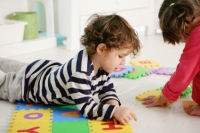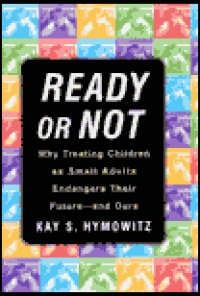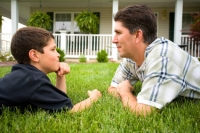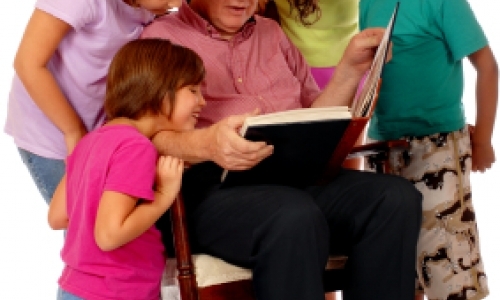Parent Center
Welcome to the Parent Center, where you’ll learn to be a more loving and effective parent.
Featured
Who's In Charge Here?

This drama illustrates a typical situation in marriage. Both partners are absolutely right. Yet neither one can acknowledge the other's point of view.
Andrea is 100% correct. You can't be successful in life unless you're focused and are able to delay your gratification. You've got to know how to say, "No." That's what discipline is and it's the job of a parent to help his kid understand that.
On the other hand, Ron's also right. There's too much emphasis on work and productivity in our culture. We have forgotten how to make time for friends, for family and for ourselves. We are a society of driven people who have sacrificed home and family for the marketplace.
Their challenge as a couple is to learn how to reconcile their differences so that they can teach their son how to integrate a life of friendship, play and entertainment with discipline, achievement and productivity.
How can Ron and Andrea learn to hear each other's point of view?
What do you think is their real point of difference?
The Unbearable Agony Of Being Lost In Love: A Monologue on Obsession
Is My Child Normal? Early Childhood Physical Development

From the time of a baby's birth, we eagerly wait for the day when our child will start to roll over, crawl and then walk. Unlike speech and language development, these milestones are at first glance easily determined. Either a child rolls over or he doesn't. Either he crawls or he walks.
School Age
Nine-Year-Old Doesn't Like School

A parent writes, “Our nine-year-old son has begun to express an intense dislike for school. In the morning, he will say he is not attending school. He may refuse to dress and will do so after our most determined insistence only. He cries at times. He has repeatedly expressed feeling tired. He may willingly agree to do homework, but does it poorly, or does not complete it without some kind of unpleasant episode.” Read what Dr. Sylvia Rimm advises this distraught parent, about helping the child to overcome hurdles now and in the future.
Book Review
Have We Let The Kids Take Over?

Sherri Mandell reviews Kay S. Hymowitz’s book Ready or Not: Why Treating Children as Small Adults Endangers Their Future-- and Ours
Early Childhood
Feeling Overwhelmed for Myself and My Son

Window Into Your Teen’s World
Acquaintance Rape: One Woman's Story

Communication
Teaching Children Respect In an Age Of Equality
Remember those "Question Authority" buttons that were popular in the 1960's? Some baby boomer parents take an ideological stand against any role distinctions that are "given" rather than earned. After fighting against oppressive power structures in their young adulthood, they are reluctant to demand honor and respect from their children simply because of their status as parents. For other parents, their own childhood experience of "not having been heard" leads them to be cautious about being less than perfectly attuned and deeply respectful of their children's feelings and needs. Yet, paradoxically, parents who listen terribly hard all the time and strive for equality and fairness in everything SOMETIMES find themselves with demanding, greedy, anxious children.
Teaching Kids Tolerance
Our children see so much prejudice around them - between blacks and whites, haves and have-nots, even thin people and fat people. How can we work against the prevailing atmosphere and teach our children tolerance? Guest Expert Paula Green, Ph.D., says: Studies show that the three areas in which children learn tolerance or intolerance are the home, school and the media, in that order. Even if you have a progressive home, intolerance, as you pointed out, is in the air and children absorb it like sponges. The globalization of trade and capital has also produced the globalization of humanity. We see so much more diversity now.
Parenting with Love
As parents, we take our love for our children as a given. But do we consider whether the way we talk to our children communicates that love to them? Many of us have a tendency to use "negatives" when talking with our kids. "Don't do that," "Stop," "No," "If you do that one more time then...." Do these phrases sound familiar? If so, then it may be time to consider another approach...positive parenting. WHAT IS POSITIVE PARENTING? Children crave attention. It shows that they are important and that their parents care about them.
Being Present with Your Children - Thich Nhat Hanh on Parenting
"Breathing in, I am calm. Breathing out, I smile. "Next time you are angry or jealous of your brother or sister, or when you are unhappy with a friend, stop and do this exercise." This advice was addressed to a group of children by a student of the Venerable Thich Nhat Hanh, internationally renowned Zen master, peace activist and Nobel Prize nominee.
The Seven Spiritual Laws for Parents:Guiding Your Children to Success and Fulfillment by Deepak Chopra
Dr. Deepak Chopra, the well-known author and lecturer on East-West spirituality has once again translated fundamental Eastern spiritual laws into easy to read Western language. The book is addressed to parents who wish to raise children with values that both satisfy spiritual needs and create the experience of abundance. The book explores specific ways to practice the Seven Spiritual Laws as a family, how to convey these laws to children of different ages, and how to embody the laws in age-specific activities each day of the week.
Twelve-Year-Old Dancer
Dear WholeDad: My 12-year-old daughter has an outstanding talent for dancing. I'm not saying that just because she's my daughter. I am able to judge my children's potentials quite accurately. I believe that she herself knows that she has the ability to create an outstanding career in this field. And yet she refuses to display her gift in any public way. The only times she is prepared to dance is in the informal setting of our nuclear family. No words of positive reinforcement will persuade her to develop her skill. On the one hand I cannot and don't believe in forcing my kids to do things that are not part of their mandatory education, yet I fear that if I cannot convince her to maximize herself, she will regret not having "seized the day" when it is already too late.
The Magic Of Reading Aloud to Big Kids
It was 10:40 on a school night, the end of the last shift of the day, which had seemed more difficult than usual: homework and bath time had been laborious and fraught with resistance, bedtime was now forty five minutes late. And so I cannot tell you why I and my sons, Ariel, 11 and Ben, nine, were all in Ben's bed when I opened The Secret Garden and began reading aloud. One of my early fantasies of motherhood had been to share this childhood favorite with my own children. But now it was 2000 and I had two boys who were competent though not avid readers, well entrenched in the popular cultures of television and computers. They are boys who spend most of their days playing sports or running around with other boys.
Should We Tell Our Son He Is Adopted?
I have been married to my second husband for seven years. The oldest of our four children is from my first marriage. My ex-husband left when I was four months pregnant with my son, so he has never seen him or had any contact with him. My husband and I started dating when my son was four months old, and he adopted my son six months after we were married. The boy is now 11, and we are not quite sure how to explain to him that his dad is not his biological father. How should we go about this? Although my husband and son have a wonderful relationship, my husband is quite concerned that our son will no longer think of him in the same way once we tell him, or even worse, he will want to see his biological father.
Writing Wrongs
As parents, my husband and I used to spend a great deal of our time hobbling around with at least one foot in our mouths. My reaction to teen problems is often of the knee-jerk variety, and my common sense goes out the window when confronted with teenage angst. My husband goes stonily silent, and gives all comers "the look." So, what is the solution, besides constant treatment for hoof-in-mouth disease? Write it! Five years ago, when my eldest child turned 13, and turned on the puberty fire full blast, I gave her a small, fat, lined notebook. It began with this forward: "My dearest daughter, today, you are on the threshold of adulthood - and I give you this notebook as a means to an end.
My Son The Artist: Expectations from a Child with Down Syndrome
My son is 15 years old. He was born with Down Syndrome. In the last 15 years I have amassed enough stories to fill volumes. However, right now I want to just stick to the topic of: Expectations. When Joshua was born the doctors advised us to not "waste our time, energy or money." They claimed that our son would never amount to anything.
The Battle Of Parents and Teens

MISLEADING TITLE! It doesn't have to be a battle. Here's the good news: It's possible to live in peace with your teen. You may wonder how I know that. Here are my credentials: 1. I am the father of three teenagers - two girls and a boy 2. I was once a teenager 3. As a psychologist who specializes in parent teen relations I have 25 years of experience listening to parents and teens complain, cry, scream and moan about their "impossible" adolescent/parents. I want to share with you my laundry list of thoughts, ideas and practical suggestions on how to relate to a teenager. At the end of this list you can add your own suggestions.
When Your Teenager Turns Into a Stranger
It was almost as if a monster had moved in with us. Overnight, our sweet 14 year old daughter changed from a friendly, loving member of the family into a terrifying stranger. It was like living with Dr. Jeckyl and Mr. Hyde. She refused to talk to us anymore, she dressed in torn rags that even a trashman wouldn't bother hauling to the dump and styled her hair into crazy designs. Everything we said to her was met with a slammed door, an angry sneer, and a turned up nose. I used to be able to talk with her easily, and we had always loved going shopping together and spending time with each other. We'd been good friends for years.
I Know You Can Hear Me, But Are You Listening?
From a WholeFamily User Dear Jenny, As a child I remember the conversations I would have with my mother. She would hear me, but not really be listening. I used to say that when I grew up I would never be like that - I would always listen to my children. Now I'm a mother of two and I often catch myself doing the same thing to my own children. And I now understand my mother. Have you ever missed what someone was saying because you were thinking about the next clever thing you were going to say? It's something people often do when arguing and often why the argument goes on and on. Nobody is listening to the other! I'm not saying that we as parents are sitting around thinking about the next clever thing to say to our children.
How to Raise Your Parents
A Letter from Jenny, 16, to her Mother Dear Mom, You did something last night that hurt me very deeply. This letter is being written after a lot of thought, because it's not the first time I've been through this with you. I'd like you to think about the difference between the two words "hearing" and "listening." I Know You Can Hear Me But Are You Listening? Dear Jenny, As a child I remember the conversations I would have with my mother. She would hear me, but not really be listening. I used to say that when I grew up I would never be like that - I would always listen to my children. Continue . . . On more than one occasion I have found myself talking to you, but actually talking to myself.
Sixteen-Year-Old Not Ready for Big Hike
Dear WholeDad: Three years ago my eldest son Michael, who was 16 years old at the time, asked my permission to go hiking in the Rockies with four friends for a week. Although the planned trip seemed very challenging for kids his age, I felt that he was mature enough to deal with the difficulties he might face. My confidence in him proved to be well founded. Last week my second son, Garth (who is now 16), informed me that he and his friends were planning a similar trip. Although Garth is a wonderful kid I feel very strongly that he is not ready at this stage for such a challenge. How can I tell him without his feeling that I think that he is inferior to his brother? A Before you take any action, you should be 100% sure that your fears about Garth's insufficiencies are founded on an objective assessment of his personality and not on a subjective need to over--protect him- - a feeling that did not exist with your older son.
Q & A: Surviving The Terrible Teens
Having "survived" teenage syndrome of two older children, I am now well into my 15-year-old daughter's phase. Of course, I should know better by this time -- and of course I don't! Knowing all the pitfalls, why do I feel so depressed and at an utter loss when she: * Leaves her room in a totally destructive state. * Screams at me for no apparent reason * Takes everybody's belongings without warning and fails to return them * Treats her younger sister badly and finally... * Totally ignores me at times, with a ruthlessness that only the young can achieve. So...help! Not for HER but for ME!! How should I feel? What should I do? A desperate Mum Jackie Goldman, MS, replies: A First of all, I want to reassure you that the way you feel is completely appropriate.
Drama: The Family Dinner
Dean, age 17, is having trouble with his family. He feels that they are stifling his freedom, and he wishes they would leave him alone.
HealthAndNutrition
Bananas: Mothers, Babies and Food: An Expert's Comments
What's going on here? We've got a good mother, who clearly cares a lot about her daughter and wants her to eat and be healthy, but somehow instead of succeeding in feeding her daughter, the mother ends up feeling unhappy and frustrated. Here is an experience that most (if not all) parents share. You want the best for your child, you try to do what you feel is right and somehow, instead of everything working out as you planned, your child ends up ignoring you. So what should this mother be doing differently? In my opinion, the main problem here is that the mother needs to have realistic expectations and be able to adapt her parenting approach to her child's developmental level.
Parenting Challenges
Interactive Features
RealLetters
Learn how to express yourself through letter writing- using proven techniques for creating positive relationships.
Family Soap Opera
Join the Austen-Kutchinskys as they struggle to make their new blended family work.
Real Life Dramas
Listen to others struggle with the marital and child-rearing challenges that stump us all.
Crisis Center
Need help with substance abuse, divorce, eating disorders, school failure, teen pregnancy, moving, depression? Visit the Crisis Center
Real Greetings
Family Fun
Fun and educational activities for the whole family.Parent Epiphanies
Great Parenting Tips
Wisdom Of The Ages







